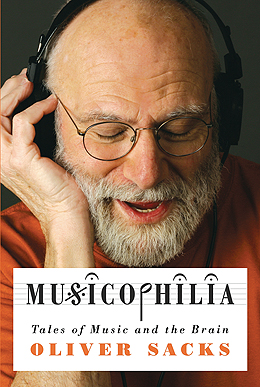|
|
 |
 |
|
BOOKSHELFOliver Sacks Explores the Allure of MusicBy Maryam Parhizkar ’09


What an odd thing it is to see an entire species — billions of people — playing with, listening to, meaningless tonal patterns, occupied and preoccupied for much of their time by what they call ‘music,’” Columbia Artist and Professor of Clinical Neurology and Psychiatry Dr. Oliver Sacks begins his preface, describing a situation in which the cerebral alien overlords of Arthur C. Clarke’s Childhood’s End attend a concert on Earth. The aliens ultimately leave in confusion, unable to comprehend what they hear. “This thing called ‘music,’ they would have to concede,” writes Sacks, “is in some way efficacious to humans, central to human life. Yet it has no concepts, makes no proposition; it lacks images, symbols, the stuff of language.” What is it that makes us such a uniquely musical species? Throughout his latest book, Musicophilia: Tales of Music and the Brain (Knopf, $26), Sacks addresses this question, exploring a spectrum of mysterious experiences from patients, musicians and everyday people and the ways in which music affects them. Take the case of Tony Ciciora, a surgeon who at 42 survived a stroke of lightning. One month later, Ciciora, who had little interest in music prior to being struck, became obsessed with playing the piano. “Something started happening in this man’s brain and mind, turning it toward music,” says Sacks in an interview, describing how Ciciora then began taking lessons in piano and composition. Within several years, he became a talented amateur musician. “There are parts of the brain, especially in the temporal lobes, where if they get excited, can give rise to musical feeling, and mystical and religious feeling,” explains Sacks, posing the possibility that effects from the lightning stroke had somehow stirred Ciciora’s lobes. Musicophilia describes several other phenomena involving music and the brain, from mentally handicapped savants with extraordinary musical talent to “amusic” people, who hear symphonies as though they were clattering pots and pans. Sacks devotes an entire chapter to the musical “brainworms” that infect our minds after hearing a catchy tune; from there he segues into the musical hallucination, a strange phenomenon that affects more people than one might expect. Sacks also delves into the miracles music can produce. In a way that recalls his widely acclaimed book Awakenings, he describes Parkinsonian patients who become temporarily reanimated by the mere mention of Chopin’s Polonaise Fantaisie. He also shares the poignant story of Clive Wearing, a once-eminent conductor who developed a severe case of retrograde amnesia from viral encephalitis. For more than 20 years, Wearing has woken up as though it were 1965, but has retained all his virtuosic talents. “It may be that Clive, incapable of remembering or anticipating events because of his amnesia,” writes Sacks, “is able to sing and play and conduct music because ... [r]emembering music, listening to it, or playing it, is entirely in the present.” What makes Sacks’ Musicophilia unique, however, is his presence in the book. Personal experiences intertwine with those of his subjects, whether it be the musical dreams evoked from listening to Mendelssohn’s Violin Concerto or, after an aunt’s death, the emotions let loose upon hearing an obscure Czech composer’s lamentations. In this way, he reminds us that we too are sometimes like the patients of dementia he describes, who depend on music for emotional revival. “Music is a part of being human, and there is no human culture in which it is not highly developed or esteemed… [it] is no luxury to them, but a necessity, and can have a power beyond anything else to restore them to themselves, and to others, at least for awhile.” Maryam Parhizkar ’09 is majoring in English and is a former CCT editorial assistant.
|
|
||||||||||||||||||||||||||||




